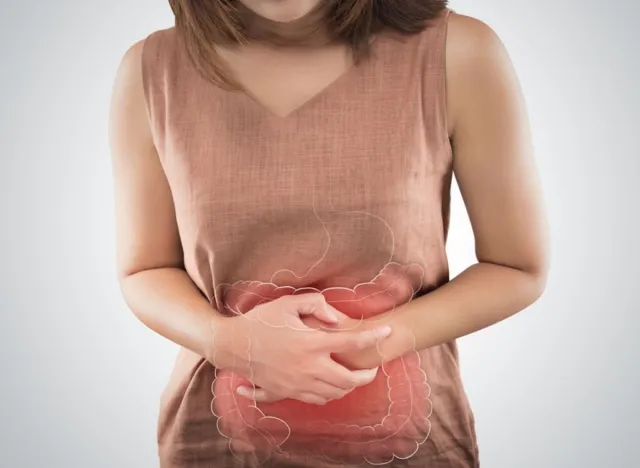If you love cheese then you are not alone. According to statistics, on average each American consumes up to 40 pounds of cheese annually. However, this really should come as no surprise. Stuffed into sandwiches, melted onto pizza, stacked high on charcuterie boards—no matter what, cheese seems to be everywhere. And while cheese is undeniably delicious, it can have downsides and unintended health side effects.
For starters, many varieties are packed with calories, fat, and sodium, which can negatively affect your physical health. Others are high in tyramine, which is a known trigger for migraines and headaches. And although the research connecting cheese intake to chronic diseases has been inconsistent, it is still important to watch out for exactly how much of this dairy product you're eating on the regular if you experience pesky problems with no unidentifiable origin.
Because of its sodium and fat content, Dr. Akua Woolbright, the national nutrition program director of Whole Foods' non-profit Whole Cities Foundation, recommends limiting cheese by sticking to 1-ounce servings of hard cheese or ½ cup servings of soft cheeses at a time. "One way to do this is to purchase varieties with stronger flavors so you can add more taste to your food with lesser amounts," she says. Some great hard cheese options include Parmesan, feta, and Swiss. "You can go a step farther by replacing whole milk cheeses with low-fat and reduced-fat options. And if you are interested in reducing your sodium intake, avoid feta and hard cheeses."
If you are someone who is looking to lower your cheese consumption—or want to give it up completely—then read below for some of the benefits you may experience when you do so. From improved skin tone to fewer headaches, giving up cheese can have some amazing effects on both the body and mind.
Your skin tone and texture may improve

Lowering your cheese, and dairy, intake may have a positive effect on both your skin tone and texture. This is because dairy products have been linked to excess oil production. "Cutting down on cheese may help in improving the skin tone as cheese may contribute to excess production of sebum that can cause breakouts or clogged pores," says Dr. Mya Bellinger, a specialist in internal medicine.
You may experience fewer headaches and migraines

If you are someone who frequently gets migraines, a diet high in cheese and dairy may be the culprit. "Cutting down on cheese may reduce headaches and migraines caused by the effects of tyramine found in cheese," explains Bellinger. Tyramine is a naturally occurring compound in plants and animal products. According to research, high amounts of tyramine in the body may trigger headaches and migraines in people.
You may lose weight

Eating excess cheese may also negatively affect any weight loss goals you may have. "Cutting down on cheese may help you reduce weight," says Bellinger. This is because of the sugar, fat, and calories often found in cheese. For example, one 100-gram serving of cheddar can have up to 33 grams of fat in it. Cutting down on cheese or instead opting for low-fat or fat-free options may help.
RELATED:
You may lessen your risk of cancer

Reducing your consumption of cheese, and dairy in general, may help lower your risk of cancer. This is because by eating less cheese you are ingesting less casein, a protein found in milk that may be linked to illness.
"Casein has been shown to increase tumor-growth rates for certain types of tumors, such as prostate cancer and potentially breast cancer," shares Dana Ellis Hunnes PhD, MPH, RD, a senior dietitian at UCLA medical center, an assistant professor at UCLA Fielding School of Public Health, and an author with Cambridge University Press of the new book Recipe for Survival (2022). "When we eat a lot of cheese, which is primarily made with the casein fraction, we potentially increase that risk."
You'll be living more eco-friendly

Eating less cheese may not only be beneficial to your health, but may help Mother Earth, too. "It requires a lot of water to produce milk in general," Hunnes points out. She shares that it takes three times as much water to produce dairy milk as opposed to the average plant-based milk.
"From an environmental perspective, cheese is very resource-intensive," says Hunnes. "It requires a lot of land to produce enough milk to make a pound of cheese, it requires thousands of gallons of water to produce a pound of cheese, and it emits a lot of methane from the cows themselves."
You may lower inflammation in your body

Bess Berger, RDN, CDN, and owner of Nutrition by Bess points out that cheese and dairy contain a lot of additives, preservatives, and hormones, which may cause inflammation in the body. "As a PCOS dietitian, I see women take out dairy and they report headaches and other inflammatory responses calm down," Berger says. "Unfortunately, the quality of dairy products today is considerably less and more modified than it was even twenty years ago—this affects a lot of us and I see this with women all the time,"
If you still would like to eat cheese, Hunnes recommends choosing ones with fewer additives. "Less-processed cheeses are somewhat healthier than others," suggests Hunnes. "If you are going to eat cheese, I recommend one with the fewest number of ingredients possible, and as possible, from a humane-raised farm."
You may experience less bloating

If you are someone who struggles with digestive issues and experiences frequent bloating, then cutting out or limiting cheese and dairy may help reverse this. "For many, dairy can cause stomach upset and bloating due to either a lack of adequate enzymes to break down milk sugar or an actual allergy," says Trista Best, a Registered Dietitian at Balance One Supplements, an environmental health specialist, and an adjunct nutrition professor.
"Those lacking adequate amounts of lactase, the enzyme that digests milk sugar, are known to be lactose intolerant and experience excessive GI upset and bloating when consuming dairy," Best adds. Try opting for dairy-free cheese if you feel this may be you.